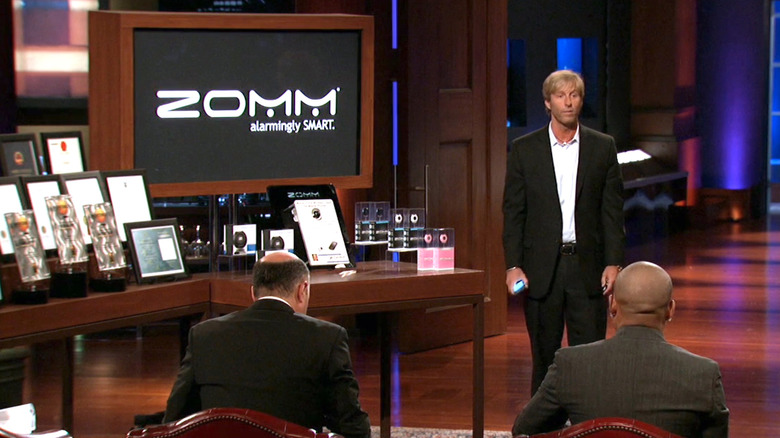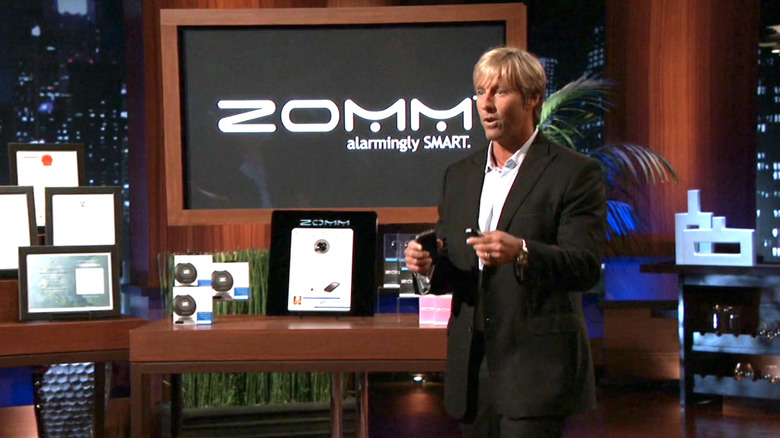What Happened To The Zomm Wireless Tether From Shark Tank Season 4?
Technology has always been a big part of the ongoing "Shark Tank" narrative. That's likely to be true as long as the hit reality series is on the air because, well, there's always going to be some cool new app like Fixed or a gadget such as the Breathometer that looks primed to make a splash in the consumer arena. It was just such a product that entrepreneur Henry Penix appeared to be hocking when he walked into the "Shark Tank" studio during the series' fourth season with the Zomm Wireless Tether.
If you're having trouble recalling Penix and his Zomm wireless gizmo — the episode aired in 2012, after all — the device had the look of one of those "slightly ahead of the market" sorts. Zomm was designed to pair with a mobile device via a Bluetooth-enabled key fob for the purpose of delivering a few intriguing functions, not the least of which is raising an alert for users on occasions when they might mistakenly leave their mobile device behind when out on the town. Likewise, the same function could be used to help locate lost keys, and Zomm could even be programmed to auto-dial an emergency contact when needed.
Yes, there were similar products on the market back in 2012, but few, if any, offered all three functions in the same device. For that reason, Penix was asking for a $2 million investment for just 10% of Zomm. Here's how things played out for the entrepreneur.
What happened to the Zomm Wireless Tether on Shark Tank
"Shark Tank" diehards know that the $2 million figure easily ranks on the higher end of investment asks made on the series' sound stage. The fact was not lost on panelists like Mark Cuban and Laurie Greiner, who openly flinch at the number, particularly at the 10% equity Penix was offering. For point of reference, those numbers translate to a $20 million valuation, begging Daymond John to ask what, exactly, about Zomm merited such a lofty figure.
Penix answered the query by noting the device's uniqueness in the market, and followed that up with some sales figures that clearly piqued the interest of the panelists. In fact, he claimed Zomm had $5 million in sales in 2011 and that the number was set to grow by more than $2 million in 2012. Per Penix, Zomm was also set to net a cool $2 million that year. Of course, numbers like that led the savvier Sharks to question why he was in the studio asking for a $2 million investment when he appeared to have capital to spend.
Penix did not have good answers to that question. Moreover, when he was pressed about how Zomm had blown through the $9 million of investment capital it had already raised, and how much of that was spent on research and development, he appeared to be actively dodging the questions. Given the uncertainty, you could see the Sharks' grins turn to quizzical stares. Eventually, all five panelists would give Penix the customary "Shark Tank" kiss-off by stating, "I'm out."
What happened to the Zomm Wireless Tether after Shark Tank?
Henry Penix was clearly upset at the round of rejections, and even asked the tech-savvy Mark Cuban if he was sure he wanted to pass on Zomm before his pitch ended. As it was, the Sharks were pretty disappointed that Penix didn't come to "Shark Tank" earlier in its development, with Cuban himself admitting he would've jumped at the chance to invest in such a product prior to Zomm reaching its then-current state of operations. Robert Herjavec clearly agreed, and even went so far as to state, "The real shame there? That (Zomm) was a great product."
Consumers were largely in agreement about Zomm's merits, and per some reports, the device saw a spike in sales in the wake of the disappointing "Shark Tank" appearance. Riding the "Shark Tank Bump" to an increase in exposure, Penix and Team Zomm were able to keep the boat afloat for several more years. At one point, the company's clever wireless leash was even being sold through Amazon.
It would seem, however, that Penix and his fellow Zomm investors were not able to solve some of the problems already facing the company when he appeared on "Shark Tank." By 2018, the troubles facing the company were too great to recover from, and Zomm appeared to have gone out of business. That much was seemingly confirmed by Penix's LinkedIn page, which notes that he was operating as the company's co-founder and Chief Executive Officer until 2018. Likewise, Zomm products are no longer available for sale either on Amazon or the company's website.
What is Zomm's founder up to today?
In an interesting side note to Henry Penix's time with Zomm, it seems the company actually sued Apple Inc. before shutting its doors in 2018. The legal filings claimed that the tech giant stole the "Emergency SOS" safety feature that it utilizes in its Apple Watch from Zomm. However, the legal proceedings were ultimately dismissed after a patent tribunal sided with Apple in the matter.
It is uncertain how, or if, a legal win against mighty Apple might've changed things for Penix and Zomm. Whatever the case, Penix did what most entrepreneurial sorts do when one of their businesses goes under, and moved on to the next big opportunity. The Zomm co-founder had sheepishly teased during his "Shark Tank" pitch that his crew was already developing another potentially lucrative technology, even as he was seeking to raise additional capital for the wireless tether. It's uncertain whether or not Soaak Health Technologies was the noted venture, but that is where Penix is currently hanging his proverbial hat.
Per LinkedIn, Penix is now the CEO, chairman, and co-founder of that outfit, which claims to be focused on developing health and wellness technologies, and has been around in some form since 2017. As for what, exactly, Soaak is, the company's website purports to offer "Transformative Health Technologies" using a whole-person approach to healing. It does so via the use of an app, virtual health services, and physical clinics. Soaak appears to be doing well for now, too, boasting partnerships with the U.S. Air Force and Amazon Alexa, among other outfits.



